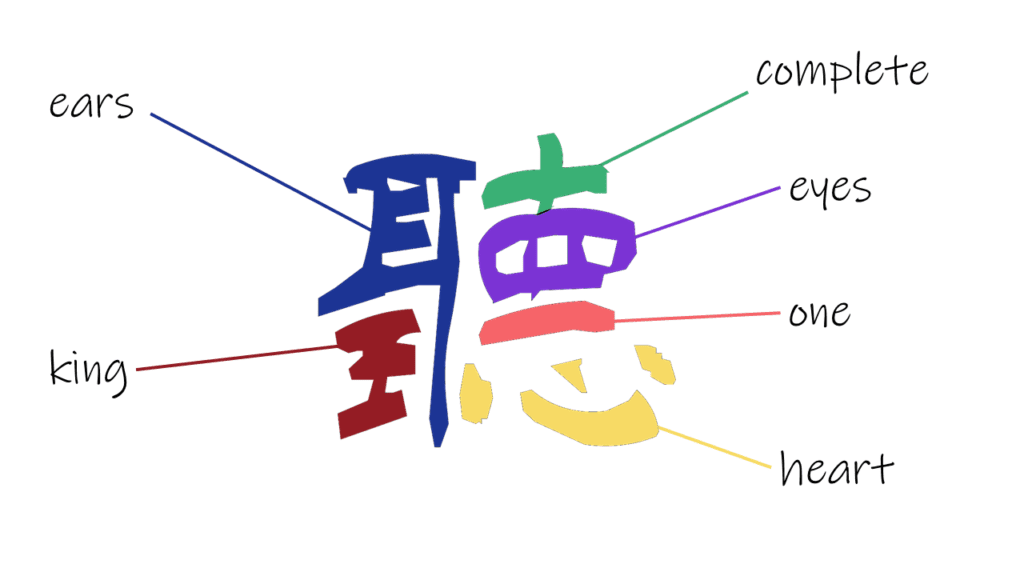Life
The Anatomy of Genuine Listening From a Traditional Chinese Character

The oxford dictionary defines “listen” as “giving one’s attention to a sound.” While this definition captures an essential part of the definition, it oversimplifies the listening process. Listening involves giving! Giving a lot more than mere attention, but undivided attention.
Listening involves giving our heart, eyes, effort, love and so much more. The process of listening is so complex that no single definition can fully capture what really happens when one listens. As a result, from a single Traditional Chinese character, I will show that “genuine listening” involves more than auditory perception.

(“聽“ pronounced “ting” ) which literally means “listen” is a phono-semantic compound made up of several distinctive parts, each carrying meaning that represents what we actually “give” when involved in the listening process. As can be seen from the character, the word “耳” which means “ear” is just part of a whole. Listening involves more than auditory perception. Genuine listening happens when instead of saying “I am all ears” we say “I am all present.”
Genuine listening means giving our heart (心 – xin)
People come to us, because they need to be understood. Listening to them with empathy could be the greatest gift we will ever give them. Being heard and understood feels good because it is connected to our deepest sense of self-worth. Listening to someone with empathy means caring and acknowledging.
Empathetic listening can’t unfold when we are overwhelmed by worries. The golden rule is to be self-aware and to never get into a conversation when we’re not emotionally prepared. Any attempt to get into a conversation when we don’t feel like it will come across insincere and can’t be concealed.
Listening with empathy gives the other person a chance to unfold as they are and to fully express themselves. This meaning is conveyed by the character (心 pronounced “xin” meaning“Heart”).
“The most basic of human need is to understand and be understood. The best way to understand people is to listen to them.”- Ralph Nichols
Genuine listening means maintaining eye-contact (目)
When engaged in a conversation, words represent a fraction of the meaning that is conveyed. A lot more information is transmitted nonverbally. Albert Mehrabian, a pioneer researcher of body language in the 1950’s, found that the total impact of a message is about 7 percent verbal, 38 percent vocal and 55 percent nonverbal. Since then, many researchers have replicated his research and found consistent results.
Respectful eye-contact is the agent that dissolves the boundary between the verbal and nonverbal. It brings a pure quality of receptivity as it opens the window to content and context of the message. Rid yourself of all visual distractions, open the window to your soul to person talking to you. This is the meaning of the “eyes” part of the Chinese character “目”(pronounced “mu”) which literally means “eyes.”
Listening means giving your undivided attention as you would a king (王)
When was the last time you gave your undivided attention to someone you were talking to? The challenge here is to bring our full attention to the person whom we are talking to. Listening with undivided attention means do away with external distractions as well as with internal distractions.
Oftentimes we listen with our attention focused on how we are going to respond or refute what the other person is saying. Genuine listening is different, it involves listening with curiosity, compassion, and with the true purpose of understanding. Imagine being invited to a royal feast. Treat the other person as a king, your guest of honor, because they are. This is what these Chinese characters mean (pronounced “yi” meaning “one,” and 王 pronounced, “wang” meaning “king”).
“Hearing is listening to what is said. Listening is hearing what isn’t said.” – Simon Sinek
Genuine listening assumes everyone is whole (十 )
The evidence of fingerprinting conveys an important truth that seems to elude us most of the time: each of us is unique. There are no “two” individuals with the same fingerprint. If we hold this simple fact upfront, we shall become more tolerant. We shall stop using our perceptual filters to judge others when difference of opinions emerges.
We become fully appreciative of the other, understanding that their uniqueness and wholeness are to be celebrated. This new paradigm shift will allow us to be whole again, and consequently make those around us feel the same. After all, if you see yourself as an individual worthy of being understood for who you are, why not do the same to others? This is the meaning conveyed by the last Chinese character 十 (shi), which means complete.
Imagine a world where everyone felt heard and understood. Wouldn’t you want to live in a such a world? I would! May these simple yet powerfully transformative principles inspire you to help create a culture built around empathy and love.
Image courtesy of Twenty20.com
Did You Know
How Skilled Migrants Are Building Successful Careers After Moving Countries
Behind every successful skilled migrant career is a mix of resilience, strategy, and navigating systems built for locals.

Moving to a new country for work is exciting, but it can also be unnerving. Skilled migrants leave behind familiar systems, networks, and support to pursue better job opportunities and a better future for their families. (more…)
Life
10 Research-Backed Steps to Create Real Change This New Year
This New Year could finally be the one where you break old patterns and create real, lasting change.

Every New Year, we make plans and set goals, but often repeat old patterns. (more…)
Life
9 Harsh Truths Every Young Man Must Face to Succeed in the Modern World
Before chasing success, every young man needs to face these 9 brutal realities shaping masculinity in the modern world.

Many young men today quietly battle depression, loneliness, and a sense of confusion about who they’re meant to be.
Some blame the lack of deep friendships or romantic relationships. Others feel lost in a digital world that often labels traditional masculinity as “toxic.”
But the truth is this: becoming a man in the modern age takes more than just surviving. It takes resilience, direction, and a willingness to grow even when no one’s watching.
Success doesn’t arrive by accident or luck. It’s built on discipline, sacrifice, and consistency.
Here are 9 harsh truths every young man should know if he wants to thrive, not just survive, in the digital age.
1. Never Use Your Illness as an Excuse
As Dr. Jordan B. Peterson often says, successful people don’t complain; they act.
Your illness, hardship, or struggle shouldn’t define your limits; it should define your motivation. Rest when you must, but always get back up and keep building your dreams. Motivation doesn’t appear magically. It comes after you take action.
Here are five key lessons I’ve learned from Dr. Peterson:
-
Learn to write clearly; clarity of thought makes you dangerous.
-
Read quality literature in your free time.
-
Nurture a strong relationship with your family.
-
Share your ideas publicly; your voice matters.
-
Become a “monster”, powerful, but disciplined enough to control it.
The best leaders and thinkers are grounded. They welcome criticism, adapt quickly, and keep moving forward no matter what.
2. You Can’t Please Everyone And That’s Okay
You don’t need a crowd of people to feel fulfilled. You need a few friends who genuinely accept you for who you are.
If your circle doesn’t bring out your best, it’s okay to walk away. Solitude can be a powerful teacher. It gives you space to understand what you truly want from life. Remember, successful men aren’t people-pleasers; they’re purpose-driven.
3. You Can Control the Process, Not the Outcome
Especially in creative work, writing, business, or content creation, you control effort, not results.
You might publish two articles a day, but you can’t dictate which one will go viral. Focus on mastery, not metrics. Many great writers toiled for years in obscurity before anyone noticed them. Rejection, criticism, and indifference are all part of the path.
The best creators focus on storytelling, not applause.
4. Rejection Is Never Personal
Rejection doesn’t mean you’re unworthy. It simply means your offer, idea, or timing didn’t align.
Every successful person has faced rejection repeatedly. What separates them is persistence and perspective. They see rejection as feedback, not failure. The faster you learn that truth, the faster you’ll grow.
5. Women Value Comfort and Security
Understanding women requires maturity and empathy.
Through books, lectures, and personal growth, I’ve learned that most women desire a man who is grounded, intelligent, confident, emotionally stable, and consistent. Some want humor, others intellect, but nearly all want to feel safe and supported.
Instead of chasing attention, work on self-improvement. Build competence and confidence, and the rest will follow naturally.
6. There’s No Such Thing as Failure, Only Lessons
A powerful lesson from Neuro-Linguistic Programming: failure only exists when you stop trying.
Every mistake brings data. Every setback builds wisdom. The most successful men aren’t fearless. They’ve simply learned to act despite fear.
Be proud of your scars. They’re proof you were brave enough to try.
7. Public Speaking Is an Art Form
Public speaking is one of the most valuable and underrated skills a man can master.
It’s not about perfection; it’s about connection. The best speakers tell stories, inspire confidence, and make people feel seen. They research deeply, speak honestly, and practice relentlessly.
If you can speak well, you can lead, sell, teach, and inspire. Start small, practice at work, in class, or even in front of a mirror, and watch your confidence skyrocket.
8. Teaching Is Leadership in Disguise
Great teachers are not just knowledgeable. They’re brave, compassionate, and disciplined.
Teaching forces you to articulate what you know, and in doing so, you master it at a deeper level. Whether you’re mentoring a peer, leading a team, or sharing insights online, teaching refines your purpose.
Lifelong learners become lifelong leaders.
9. Study Human Nature to Achieve Your Dreams
One of the toughest lessons to accept: most people are self-interested.
That’s not cynicism, it’s human nature. Understanding this helps you navigate relationships, business, and communication more effectively.
Everyone has a darker side, but successful people learn to channel theirs productively into discipline, creativity, and drive.
Psychology isn’t just theory; it’s a toolkit. Learn how people think, act, and decide, and you’ll know how to lead them, influence them, and even understand yourself better.
Final Thoughts
The digital age offers endless opportunities, but only to those who are willing to take responsibility, confront discomfort, and keep improving.
Becoming a man today means embracing the hard truths most avoid.
Because at the end of the day, success isn’t about luck. It’s about who you become when life tests you the most.
Change Your Mindset
The Four Types of Happiness: Which One Are You Living In?
Most people chase success only to find emptiness, this model reveals why true happiness lies somewhere else.

In a world driven by rapid technological growth and constant competition, many people unknowingly trade joy for achievement. (more…)
-

 News4 weeks ago
News4 weeks agoBrandon Willington Builds 7-Figure Business by Ignoring Almost Everything
-

 Business3 weeks ago
Business3 weeks agoEntrepreneur’s Guide to Pay Stubs: Why Freelancers and Small Business Owners Need a Smart Generator
-

 Business2 weeks ago
Business2 weeks agoThe Salary Shift Giving UK Employers An Unexpected Edge
-

 Scale Your Business3 weeks ago
Scale Your Business3 weeks ago5 Real Ways to Grow Your User Base Fast
-

 Business3 weeks ago
Business3 weeks agoThe Simple Security Stack Every Online Business Needs
-

 Finances3 weeks ago
Finances3 weeks agoWhy Financial Stress Is One of the Biggest Barriers to Personal Growth
-

 Business2 weeks ago
Business2 weeks agoWhy Smart FMCG Entrepreneurs Outsource What They Can’t Automate
-

 Did You Know2 weeks ago
Did You Know2 weeks agoThe SEO Traps Even Experienced Marketers Fall Into




























